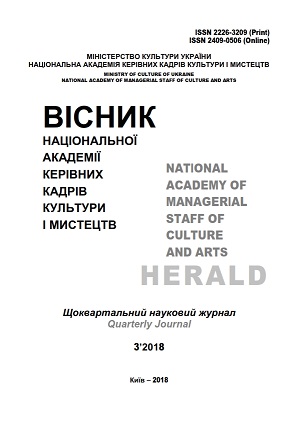The Symbolic Properties of Liturgical Singing Tradition: From the Category of Symbol to the Noetic Measurement of Culture
The Symbolic Properties of Liturgical Singing Tradition: From the Category of Symbol to the Noetic Measurement of Culture
Author(s): Svetlana Viktorivna OsadchayaSubject(s): Christian Theology and Religion, Cultural history, Customs / Folklore, Music, Sociology of Religion, History of Art
Published by: Національна академія керівних кадрів культури і мистецтв
Keywords: liturgical singing tradition; symbol; canon; noosphere; noetic culture measurements;
Summary/Abstract: The purpose of the article is to reveal the symbolic properties of the liturgical singing tradition, which allows us to trace the main parameters of the category of a symbol and to identify the noetic dimensions of culture. Research methodology assumes the use of the following general scientific methods: typological – to identify key characteristics of the liturgical singing tradition; philosophical and aesthetic, musicological analytical, historical and cultural methods. The scientific novelty of this research consists in considering the musical side of the liturgical singing tradition as the main conductor in revealing its symbolic properties. Conclusions. The canonical verbal aspect of the liturgical order, like all its verbal elements, contributes to the interaction of the external-visual and inner-auditory sides, strengthens the «rational» direction of worship, while permeating with musical-auditory emanations and acquiring some symbolic ciphering – in the case of a direct connection with the singing presentation. Thus, the religious tradition of the temple can be considered as a stable model of the «philosophical style», which in turn represents a special spiritual phenomenon that characterizes human cognitive activity and its value-semantic results. The Orthodox liturgical and singing tradition appeals to memory in its sociocultural significance and makes the phenomenon of memory leading and especially noticeable, in particular, it allows us to notice what the phenomenon of memory is related to in musical creativity. In this regard, it is especially urgent to justify the meaning of memory as a cultural universal, to define the semantic function of the notion of memory in Orthodox worship, and also to relate the phenomenon of memory to the chronotopic approach to the history of culture, with the temporal-spatial dimension of culture.
Journal: Вісник Національної академії керівних кадрів культури і мистецтв
- Issue Year: 2018
- Issue No: 3
- Page Range: 214-218
- Page Count: 5
- Language: English

